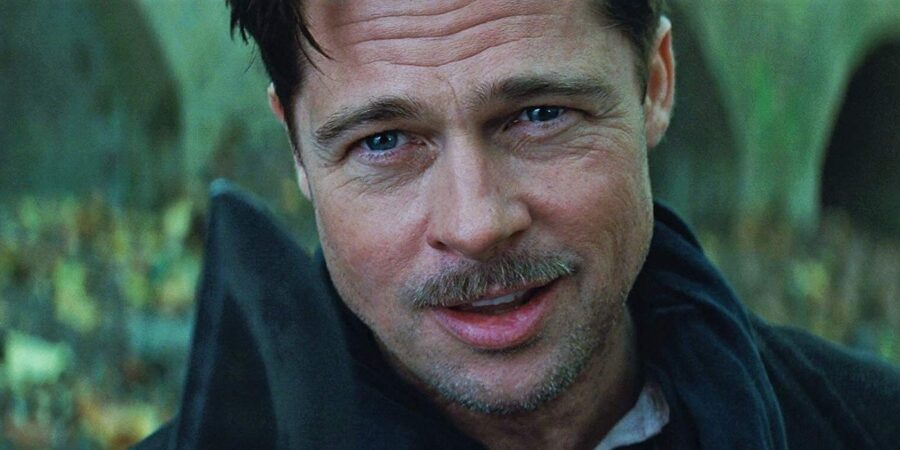A Brad Pitt Classic Just Got A Wildly Different Change To Its Ending
A classic Brad Pitt film is getting a different ending thanks to a recent re-edit, and re-release in a new market. It's a hilarious change
This article is more than 2 years old

It’s not unusual to learn about alternate endings in some of the world’s biggest movies to hit the big screen. The filmmaking process is a long-drawn-out process that tends to undergo countless changes, shifts, rewrites, and reshoots. Recently, Vice broke news about a classic Brad Pitt film released internationally with a change to the cult classics ending. The film in question, Fight Club, received a major overhaul, giving an entirely new meaning to the movie’s catchphrase, “What happens in Fight Club stays in Fight Club.”
According to multiple outlets, David Fincher’s 1999 film, Fight Club received an entirely new ending via an online release in China. The monumental ending to the anarchist-centered film shows the narrator (Edward Norton) killing his split personality Tyler Durden (Brad Pitt). Standing alongside Marla Singer (Helena Bonham Carter), the pair hold hands as they watch the buildings explode outside the window and collapse, suggesting Project Mayhem successfully launched the start of a new era of financial equilibrium.
When Fight Club aired in China via the streaming site Tencent Video, the ending with Brad Pitt and Edward Norton was completely wiped. Instead, viewers are treated to a postscript epilogue, writing in a new ending. The change, like something out of a completely different film, states that officials successfully busted Tyler’s plan to destroy the world. Here is exactly how the text reads in English: “Through the clue provided by Tyler, the police rapidly figured out the whole plan and arrested all criminals, successfully preventing the bomb from exploding,” a caption said. “After the trial, Tyler was sent to lunatic asylum receiving psychological treatment. He was discharged from the hospital in 2012.”
As absurd as the Chinese alternate ending may seem, it’s not uncommon for the communist state. While it’s common for the nation to import any big titles featuring mega-celebrities like Brad Pitt, the government is not afraid to alter a film to their liking. Imported films have long been altered by the government to depict law enforcement on the winning side of justice. However, it remains unclear if Fight Club’s ending was altered out of self-censorship or by government order. Both Tencent Video-the streaming service that first aired the alternate ending and Disney, which owns the film’s production company 20th Century Fox, did not immediately respond to the matter. However, a source familiar with the matter said the film was edited by the copyright owner and then approved by the government before it was sold to streaming sites for distribution.
Fight Club arrived on the big screen in 1999 with a bang. Helmed by David Fincher, the filmmaker also responsible for a previous Brad Pitt blockbuster, Seven, Fincher features an eclectic cast featuring Brad Pitt, Edward Norton, Helena Bonham Carter, the late Meat Loaf, and a young Jared Leto. Based on Chuck Palahniuk’s 1996 novel of the same name, Fight Club follows an unnamed narrator (Edward Norton) who suffers from insomnia. Eventually crossing paths with Tyler Durden-the charismatic soap salesman who lives the way the narrator wishes he could live, the narrator’s apartment explodes and he turns to Tyler for help. The partnership leads the duo to start a Fight Club, but the newly formed men’s group gradually transforms into something bigger. Tyler begins making plans to take unleash a new world order taking down the mega-corporations controlling much of the population’s finances.
Nearly 23 years after first laying eyes on Brad Pitt’s infamous character, Fight Club remains to grow in not only popularity but also relevance. With deeper hidden and often skewed underlying messages about corporations and anarchy, the film still inspires heated debates. After the film’s initial release, Fight Club was fiercely debated by critics with plenty claiming to love and hate the film in equal measures. There was also plenty of concern that the anarchist undertones could incite copycat behavior, and the film was even rumored to have been delayed following the deadly Columbine shooting earlier in the year. However, even knowing how controversial the film was, that’s not stopping fans of the beloved moving from expressing their outrage on the internet over China’s decision to ruin the film’s ending.












